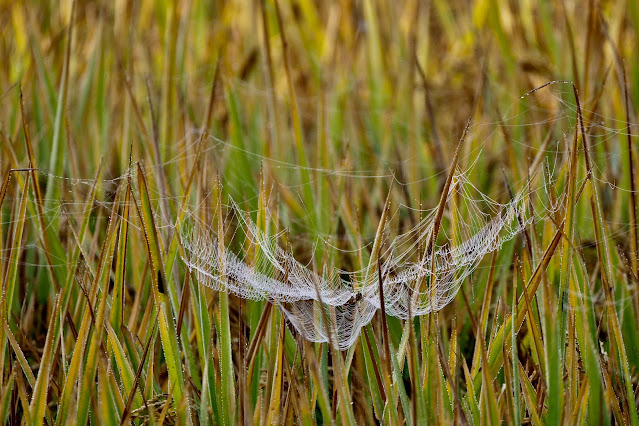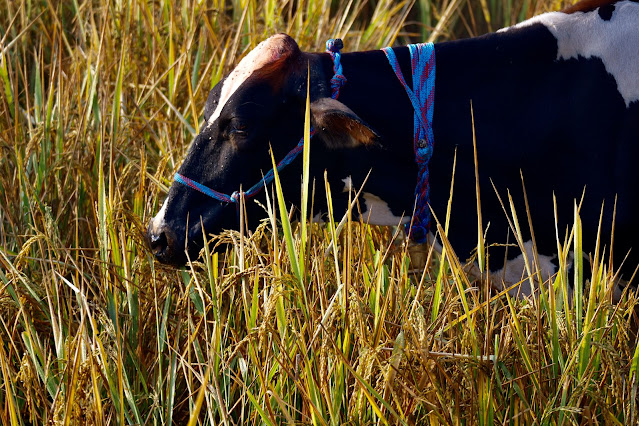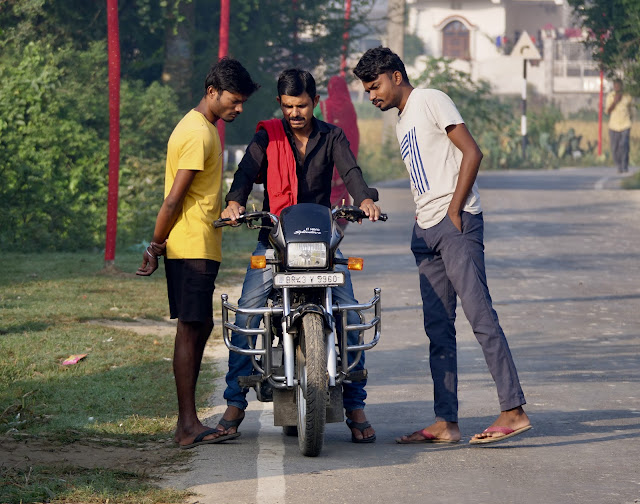The rural areas in north India have a charm of their own.
An early morning walk on a misty day, with sun rays partially obscured by the rising sun, caught my attention and told me stories of people and their journey style.
The first was the spider's web between the corn heads woven with plan and design. It had a sagging pattern deliberately designed to trap a prey with least chance for escape. I got consumed by this amazing sight! It was just a spider, planning for its daily bread.
It is a common sight men and women herding their cattle to the grazing ground in the morning. One cow left the other three while they were being led and ran ahead to get into the paddy field, which was almost ready for harvest. The herdsman did not seem bothered by it. when he called her by its name, the cow returned to the fold. The headman showed no indication of anxiety as he knew that the cow would hear his voice and return to him. I saw how a cow responded and joined the others at the bidding of the herdsman! I am familiar with dogs responding to a human command, but to see it in a cow was more than surprising. Jesus of Nazareth in his teachings said, 'the sheep hear the voice of the shepherd' !
Following this was a pleasant sight of two children returning from a shop, sharing a pocket of snacks. I wonder if it was a morning routine!
The next sight was a woman walking with her bag, possibly to her work place. All through about 100 meters I saw her walking, she had her head bowed! I wonder whether she was preoccupied with her burdens and was heavy of heart!
The two elderly men walking beside each other talking and listening was a sight of a leisurely walk that older people are used to for the pleasure of walking. They go to places where people flock in the morning often in a tea shop for tea and conversation. That is where the events of the previous 24 ours get shared and discussed. It often is a strategic place of opinion formation when people debate and exchange on affairs concerning their lives.
This scene reminded me of the time, when a good number of people from our village went to a tea shop in the morning, seventy years ago. About thirty to forty men came to talk and listen and read from the only news paper in the village, which arrived in the morning. Those who subscribed for newspapers to be delivered at home, got the newspaper at mid day, which came along with the postal mail delivery service. The tea shop owner had an arrangement with an early morning private bus service, which brought his newspaper, to ensure that customers had another reason to come to the tea shop. He ensured regular customers to come for tea through this incentive.
A fascinating sight of a Bulbul with a mouthful of the fruit, next to it, hanging from a creeper caught my attention.
The mystery of a spider weaving an intricate design, a cow with a tempered habit, children walking together, a woman appearing burdened, two men on a leisurely walk and a Bulbul with a mouthful of its morning feed, revealed the spectrum of events at the beginning of day in a village.
The colour and mood of life in a rural setting is different. We do not come across hurry and haste. We feel that people live each occasion with a sense of delight or expectation.
The burden of livelihood of the rural folk in the recent years after COVID, was evident as people talked about what they did not have or the escalating cost of living.
I stopped at a fruit shop on my way back, when the shop keeper told me that his daily sale was nearing 3000 rupees in a normal day, four years ago, which is now half of that. People's paying capacity has declined and cost of living is on the rise.
I overheard a conversation of the above three people, about the high cost of fuel and decreased mileage the motor bike gave. The other two had returned to using bicycles as their income has declined.
The rural folks have similar sad stories. Yesterday, I heard a group of delivery boys, who carry food and grocery from super markets to homes, discussing as how they earn only 20 rupees for a delivery within two kilometres. That appalled me. They do not get paid for petrol on most of the times.
I remembered how 'neighbourhood wellness services' existed after the second world war in suburban areas in some parts of Europe. The well to do people did not allow anyone suffer from lack of basic facilities.
The north eastern churches in India had a practice of requesting women to save a handful of rice, every time they cooked food, which was gathered from every home to help those who lived with meagre income.
I returned from the morning walk with these mixed feelings. There is something that I thought I too can do to respond to the unspoken
needs of others!
M.C.Mathew(text and photo)










No comments:
Post a Comment